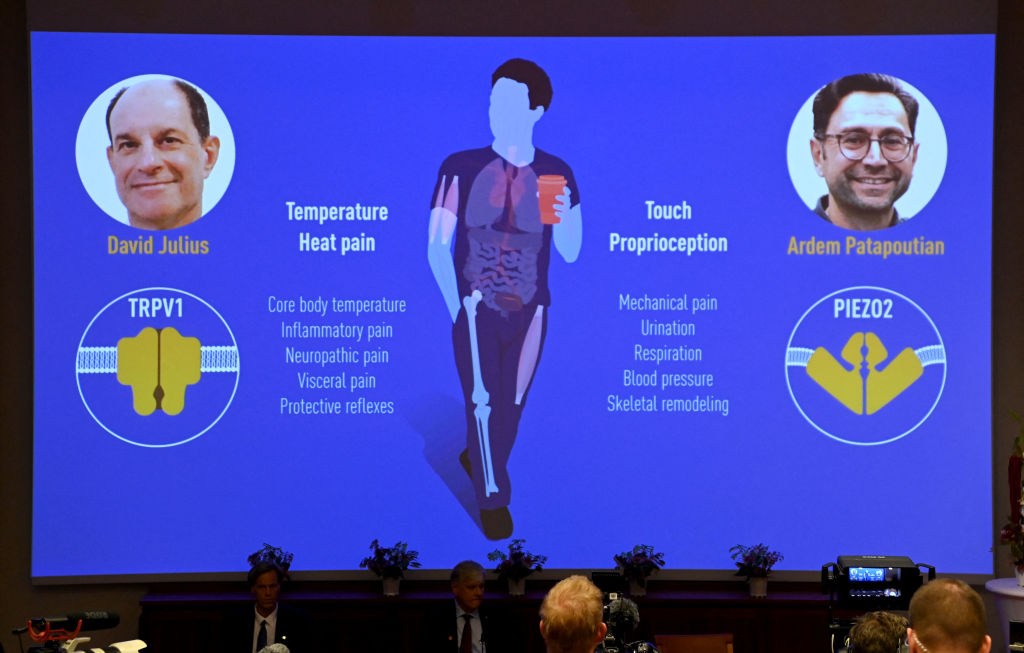Nobel Prize awarded to scientists for discovery that 'unlocks one of the secrets of nature'


A free daily email with the biggest news stories of the day – and the best features from TheWeek.com
You are now subscribed
Your newsletter sign-up was successful
The 2021 Nobel Prize in Physiology or Medicine has been awarded to two scientists for their "discoveries of receptors for temperature and touch," the Nobel Committee has announced.
Scientists David Julius and Ardem Patapoutian were jointly awarded the Nobel Prize on Monday after they conducted research into how humans sense temperature and touch, Stat News reports.
"Our ability to sense heat, cold and touch is essential for survival and underpins our interaction with the world around us," the Nobel Committee said. "In our daily lives we take these sensations for granted, but how are nerve impulses initiated so that temperature and pressure can be perceived? This question has been solved by this year's Nobel Prize laureates."
The Week
Escape your echo chamber. Get the facts behind the news, plus analysis from multiple perspectives.

Sign up for The Week's Free Newsletters
From our morning news briefing to a weekly Good News Newsletter, get the best of The Week delivered directly to your inbox.
From our morning news briefing to a weekly Good News Newsletter, get the best of The Week delivered directly to your inbox.
Julius, the Nobel Committee explained, used a compound found in chili peppers to identify a sensor in the skin's nerve endings that responds to heat, while Patapoutian discovered sensors that respond to mechanical stimuli in the skin and in internal organs. Their "breakthrough" discoveries led to a "rapid increase in our understanding of how our nervous system senses heat, cold, and mechanical stimuli," according to the Monday announcement.
Thomas Perlmann, the secretary-general of the Nobel Committee, called this a "very important and profound discovery," which "really unlocks one of the secrets of nature." The Nobel Committee noted that the question of how temperature and mechanical stimuli are "converted into electrical impulses in the nervous system" had not been solved prior to Julius' and Patapoutian's work. But Oscar Marin, director of King's College London's MRC Centre for Neurodevelopmental Disorders, told The Associated Press the discovery opens up an "an entire field of pharmacology," explaining, "Knowing how our body senses these changes is fundamental because once we know those molecules, they can be targeted."
Following this announcement, the Nobel Prize in Physics is the next prize that is set to be awarded on Tuesday.
A free daily email with the biggest news stories of the day – and the best features from TheWeek.com
Brendan worked as a culture writer at The Week from 2018 to 2023, covering the entertainment industry, including film reviews, television recaps, awards season, the box office, major movie franchises and Hollywood gossip. He has written about film and television for outlets including Bloody Disgusting, Showbiz Cheat Sheet, Heavy and The Celebrity Cafe.
-
 Switzerland could vote to cap its population
Switzerland could vote to cap its populationUnder the Radar Swiss People’s Party proposes referendum on radical anti-immigration measure to limit residents to 10 million
-
 Political cartoons for February 15
Political cartoons for February 15Cartoons Sunday's political cartoons include political ventriloquism, Europe in the middle, and more
-
 The broken water companies failing England and Wales
The broken water companies failing England and WalesExplainer With rising bills, deteriorating river health and a lack of investment, regulators face an uphill battle to stabilise the industry
-
 Blue Origin launches Mars probes in NASA debut
Blue Origin launches Mars probes in NASA debutSpeed Read The New Glenn rocket is carrying small twin spacecraft toward Mars as part of NASA’s Escapade mission
-
 Dinosaurs were thriving before asteroid, study finds
Dinosaurs were thriving before asteroid, study findsSpeed Read The dinosaurs would not have gone extinct if not for the asteroid
-
 SpaceX breaks Starship losing streak in 10th test
SpaceX breaks Starship losing streak in 10th testspeed read The Starship rocket's test flight was largely successful, deploying eight dummy satellites during its hour in space
-
 Rabbits with 'horns' sighted across Colorado
Rabbits with 'horns' sighted across Coloradospeed read These creatures are infected with the 'mostly harmless' Shope papilloma virus
-
 Lithium shows promise in Alzheimer's study
Lithium shows promise in Alzheimer's studySpeed Read Potential new treatments could use small amounts of the common metal
-
 Scientists discover cause of massive sea star die-off
Scientists discover cause of massive sea star die-offSpeed Read A bacteria related to cholera has been found responsible for the deaths of more than 5 billion sea stars
-
 'Thriving' ecosystem found 30,000 feet undersea
'Thriving' ecosystem found 30,000 feet underseaSpeed Read Researchers discovered communities of creatures living in frigid, pitch-black waters under high pressure
-
 New York plans first nuclear plant in 36 years
New York plans first nuclear plant in 36 yearsSpeed Read The plant, to be constructed somewhere in upstate New York, will produce enough energy to power a million homes
